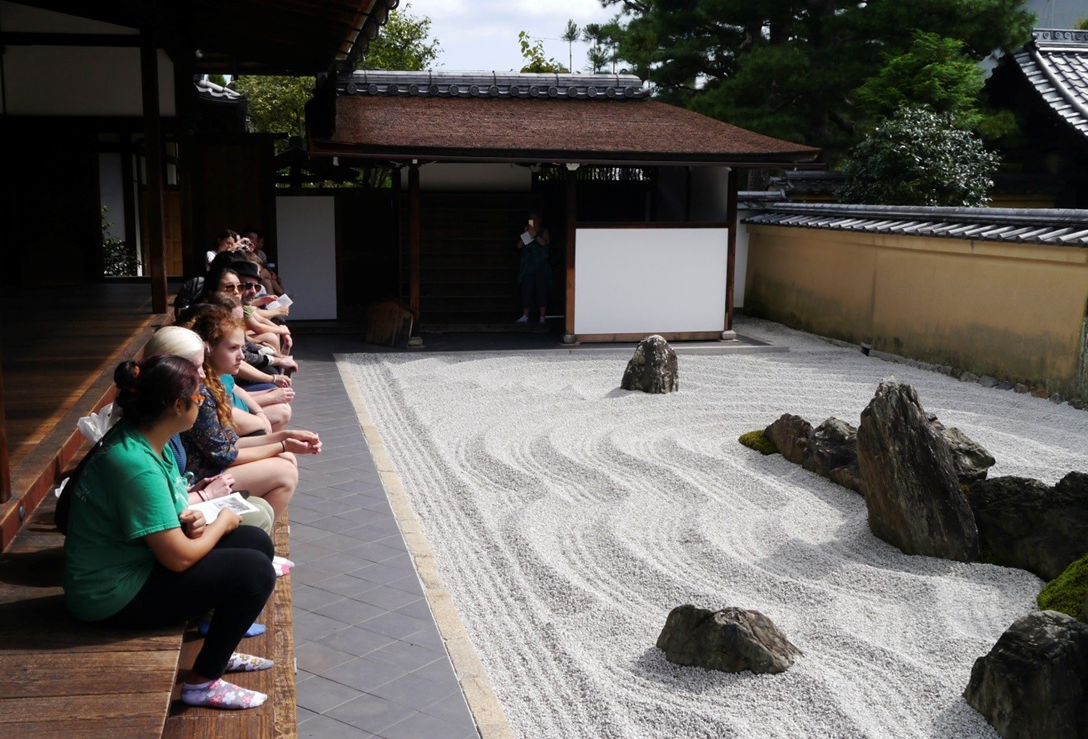Bryn Mawr LIASE 360° Courses

“Contemplative Traditions” Students reflect on the aesthetics of contemplative spaces at Zuihon-in, Kyoto
Bryn Mawr’s 360° program is an interdisciplinary experience designed to examine an issue or topic from multiple perspectives. As such, a cohort of students takes a cluster of related classes from different departments and participates in experiences outside of the traditional classroom, often involving travel abroad, which are integrated with the coursework. The LIASE grant has enabled the College to expand the 360° program by fostering growth of new clusters on Asia and the environment, while also strengthening our programs in East Asian Languages and Cultures and Environmental Studies. Read what some students have to say about their experiences with the LIASE 360° courses.
Since fall 2013, with LIASE Exploration and LIASE Implementation grant support, Bryn Mawr has offered the following 360° courses focused on Asia and the environment:
China and the Environment
Course cluster includes “China’s Environment” (Yonglin Jiang, East Asian Languages and Cultures, Bryn Mawr), “Environmental Economics” (Michael Rock, Economics, Bryn Mawr), and “Environmental Ethics” (Robert Dostal, Philosophy, Bryn Mawr)
Contemplative Traditions
Course cluster includes “The History and Rhetoric of Buddhist Meditation” (Hank Glassman, East Asian Languages and Cultures, Haverford), “Silent Spaces: A History of Contemplation in the West” (Michelle Francl, Chemistry, Bryn Mawr), and “Listening to Mind and Body: the Psychology of Mindfulness” (Marc Schulz, Psychology, Bryn Mawr)
Eurasia in Flux: Trans-Siberian Perspectives on Russia and China
Course cluster includes “The Environment on China’s Frontiers” (Yonglin Jiang, East Asian Languages and Cultures, Bryn Mawr), “Russia and the East: Siberia in Russian Culture” (Tim Harte, Russian, Bryn Mawr), and ‘survival’ language training in Chinese and Russian (Language instructors, Haverford and Bryn Mawr)
Perspectives on Sustainability: Disasters and Rebuilding in Japan
Course cluster includes “Pictured Environments: Japanese Landscapes and Cityscapes” (Tomoko Sakomura, Art History, Swarthmore), “Narratives of Disaster and Rebuilding in Japan” (Will Gardner, Japanese Language, Swarthmore), and “Disaster, War, and Rebuilding in the Japanese City” (Growth and Structure of Cities faculty, Bryn Mawr)
The 360° program has proven to be an effective structure for bringing together Asian specialists and non-specialists from the Tri-Colleges to engage both faculty and students from a range of majors in an in-depth study of issues relevant to sustainability and the environment in Asia. In course evaluations, students have reported that their participation in these 360°s have transformed their world views by helping them to connect their classroom learning experiences with global applications, to understand more deeply the relationship between humans, culture, and the environment in Asia and the U.S., and to build meaningful relationships with faculty and classmates through shared experiences during travel and site visits.


